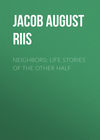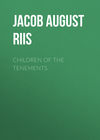Читать книгу: «Neighbors: Life Stories of the Other Half», страница 4
WHAT THE SNOWFLAKE TOLD
The first snowflake was wafted in upon the north wind to-day. I stood in my study door and watched it fall and disappear; but I knew that many would come after and hide my garden from sight ere long. What will the winter bring us? When they wake once more, the flowers that now sleep snugly under their blanket of dead leaves, what shall we have to tell?
The postman has just brought me a letter, and with it lying open before me, my thoughts wandered back to “the hard winter” of a half-score seasons ago which none of us has forgotten, when women and children starved in cold garrets while men roamed gaunt and hollow-eyed vainly seeking work. I saw the poor tenement in Rivington Street where a cobbler and his boy were fighting starvation all alone save for an occasional visit from one of Miss Wald’s nurses who kept a watchful eye on them as on so many another tottering near the edge in that perilous time, ready with the lift that brought back hope when all things seemed at an end. One day she found a stranger in the flat, a man with close-cropped hair and a hard look that told their own story. The cobbler eyed her uneasily, and, when she went, followed her out and made excuses. Yes! he was just out of prison and had come to him for shelter. He used to know him in other days, and Jim was not—
She interrupted him and shook her head. Was it good for the boy to have that kind of a man in the house?
The cobbler looked at her thoughtfully and touched her arm gently.
“This,” he said, “ain’t no winter to let a feller from Sing Sing be on the street.”
The letter the postman brought made me see all this and more in the snowflake that fell and melted in my garden. It came from a friend in the far West, a gentle, high-bred lady, and told me this story: Her sister, who devotes her life to helping the neighbor, had just been on a visit to her home. One day my friend noticed her wearing an odd knitted shawl, and spoke of it.
“Yes,” said she, “that is the shawl the cook gave me.”
“The cook?” with lifted eyebrows, I suppose. And then she heard how.
One day, going through the kitchen of the institution where she teaches, she had seen the cook in tears and inquired the cause. The poor woman sobbed out that her daughter had come home to die. The doctors had said that she might live perhaps ten days, no longer, and early and late she cried for her mother to be with her. But she had vainly tried every way to get a cook to take her place—there was none, and her child was dying in the hospital.
“And I told her to go to her right away, I would see to that; that was all,” concluded my friend’s sister; “and she gave me this shawl when she came back, and I took it, of course. She had worked it for the daughter that died.”
But it was not all. For during ten days of sweltering July heat that gentle, delicate woman herself superintended the kitchen, did the cooking, and took the place of the mother who was soothing her dying child’s brow, and no one knew it. Not here, that is. No doubt it is known, with a hundred such daily happenings that make the real story of human life, where that record is kept and cherished.
And clear across the continent it comes to solve a riddle that had puzzled me. Recently I had long arguments with a friend about religion and dogmas that didn’t help either of us. At the end of three weeks we were farther apart than when we began, and the arguments had grown into controversy that made us both unhappy. We had to have a regular treaty of peace to get over it. I know why now. The snowflake and my friend’s letter told me. Those two, the cobbler and the woman, were real Christians. They had the secret. They knew the neighbor, if neither had ever heard of dogma or creed. Our arguments were worse than wasted, though we both meant well, for we were nearer neighbors when we began than when we left off.
I am not learned in such things. Perhaps I am wrong. No doubt dogmas are useful—to wrap things in—but even then I would not tuck in the ends, lest we hide the neighbor so that we cannot see him. After all, it is what is in the package that counts. To me it is the evidence of such as these that God lives in human hearts—that we are molded in his image despite flaws and failures in the casting—that keeps alive the belief that we shall wake with the flowers to a fairer spring. Is it not so with all of us?
THE CITY’S HEART
“Bosh!” said my friend, jabbing impatiently with his stick at a gaunt cat in the gutter, “all bosh! A city has no heart. It’s incorporated selfishness; has to be. Slopping over is not business. City is all business. A poet’s dream, my good fellow; pretty but moonshine!”
We turned the corner of the tenement street as he spoke. The placid river was before us, with the moonlight upon it. Far as the eye reached, up and down the stream, the shores lay outlined by rows of electric lamps, like strings of shining pearls; red lights and green fights moved upon the water. From a roofed-over pier near by came the joyous shouts of troops of children, and the rhythmic tramp of many feet to the strains of “Could you be true to eyes of blue if you looked into eyes of brown?” A “play-pier” in evening session.
I looked at my friend. He stood gazing out over the river, hat in hand, the gentle sea-breeze caressing the lock at his temple that is turning gray. Something he started to say had died on his lips. He was listening to the laughter of the children. What thoughts of days long gone, before the office and the market reports shut youth and sunshine out of his life, came to soften the hard lines in his face, I do not know. As I watched, the music on the pier died away in a great hush. The river with its lights was gone; my friend was gone. The years were gone with their burden. The world was young once more.
I was in a court-room full of men with pale, stern faces. I saw a child brought in, carried in a horse-blanket, at the sight of which men wept aloud. I saw it laid at the feet of the judge, who turned his face away, and in the stillness of that court-room I heard a voice raised claiming for the human child the protection men had denied it, in the name of the homeless cur of the street. And I heard the story of little Mary Ellen told again, that stirred the souls of a city and roused the conscience of a world that had forgotten. The sweet-faced missionary who found Mary Ellen was there, wife of a newspaper man—happy augury; where the gospel of faith and the gospel of facts join hands the world moves. She told how the poor consumptive in the dark slum tenement, at whose bedside she daily read the Bible, could not die in peace while “the child they called Mary Ellen” was beaten and tortured in the next flat; and how on weary feet she went from door to door of the powerful, vainly begging mercy for it and peace for her dying friend. The police told her to furnish evidence, prove crime, or they could not move; the societies said: “bring the child to us legally, and we will see; till then we can do nothing”; the charitable said, “it is dangerous to interfere between parent and child; better let it alone.” And the judges said that it was even so; it was for them to see that men walked in the way laid down, not to find it—until her woman’s heart rebelled in anger against it all, and she sought the great friend of the dumb brute, who made a way.
“The child is an animal,” he said. “If there is no justice for it as a human being, it shall at least have the rights of the cur in the street. It shall not be abused.”
And as I looked I knew that I was where the first charter of the Children’s rights was written under warrant of that made for the dog; for from that dingy court-room, whence a wicked woman went to jail, thirty years ago came forth the Children’s Society, with all it has meant to the world’s life. It is quickening its pulse to this day in lands and among peoples who never spoke the name of my city and Mary Ellen’s. For her—her life has run since like an even summer stream between flowery shores. When last I had news of her, she was the happy wife of a prosperous farmer up-State.
The lights on the river shone out once more. From the pier came a chorus of children’s voices singing “Sunday Afternoon” as only East Side children can. My friend was listening intently. Aye, well did I remember the wail that came to the Police Board, in the days that are gone, from a pastor over there. “The children disturb our worship,” he wrote; “they gather in the street at my church and sing and play while we would pray”; and the bitter retort of the police captain of the precinct: “They have no other place to play; better pray for sense to help them get one.” I saw him the other day—the preacher—singing to the children in the tenement street and giving them flowers; and I knew that the day of sense and of charity had swept him with it.
The present is swallowed up again, and there rises before me the wraith of a village church in the far-off mountains of Pennsylvania. It is Sunday morning at midsummer. In the pulpit a young clergyman is preaching from the text: “Inasmuch as ye did it unto one of these my brethren, even the least, ye did it unto me.” The sun peeps through the windows, where climbing roses nod. In the tall maples a dove is cooing; the drowsy hum of the honey-bee is on the air. But he recks not of these, nor of the peaceful day. His soul has seen a vision of hot and stony streets, of squalid homes, of hard-visaged, unlovely childhood, of mankind made in His image twisted by want and ignorance into monstrous deformity: and the message he speaks goes straight to the heart of the plain farmers on the benches; His brethren these, and steeped in the slum! They gather round him after the service, their hearts burning within them.
I see him speeding the next day toward the great city, a messenger of love and pity and help. I see him return before the week’s end, nine starved urchins clinging to his hands and the skirts of his coat, the first Fresh Air party that went out of New York twoscore years ago. I see the big-hearted farmers take them into their homes and hearts. I see the sun and the summer wind put back color in the wan cheek, and life in the shrunken and starved frame. I hear the message of one of the little ones to her chums left behind in the tenement: “I can have two pieces of pie to eat, and nobody says nothing if I take three pieces of cake”; and I know what it means to them. Laugh? Yes! laugh and be glad. The world has sorrow enough. Let in the sunshine where you can, and know that it means life to these, life now and a glimpse of the hereafter. I can hear it yet, the sigh of the tired mother under the trees on Twin Island, our Henry-street children’s summer home: “If heaven is like this, I don’t care how soon I go.”
For the sermon had wings; and whithersoever it went blessings sprang in its track. Love and justice grew; men read the brotherhood into the sunlight and the fields and the woods, and the brotherhood became real. I see the minister, no longer so young, sitting in his office in the “Tribune” building, still planning Fresh Air holidays for the children of the hot, stony city. But he seeks them himself no more. A thousand churches, charities, kindergartens, settlements, a thousand preachers and doers of the brotherhood, gather them in. A thousand trains of many crowded cars carry them to the homes that are waiting for them wherever men and women with warm hearts live. The message has traveled to the farthest shores, and nowhere in the Christian world is there a place where it has not been heard and heeded. Wherever it has, there you have seen the heart of man laid bare; and the sight is good.
“’Way—down—yonder—in—the—corn-field,” brayed the band, and the shrill chorus took up the words. At last they meant something to them. It was worth living in the day that taught that lesson to the children of the tenements. Other visions, new scenes, came trooping by on the refrain: the farm-homes far and near where they found, as the years passed and the new love grew and warmed the hearts, that they had entertained angels unawares; the host of boys and girls, greater than would people a city, that have gone out to take with the old folks the place of the lads who would not stay on the land, and have grown up sturdy men and women, good citizens, governors of States some of them, cheating the slum of its due; the floating hospitals that carry their cargoes of white and helpless little sufferers down the bay in the hot summer days, and bring them back at night sitting bolt upright at the supper-table and hammering it with their spoons, shouting for more; the new day that shines through the windows of our school-houses, dispelling the nightmare of dry-as-dust pedagoguery, and plants brass-bands upon the roof of the school, where the children dance and are happy under the stars; that builds play-piers and neighborhood parks in which never a sign “Keep off the Grass” shall stand to their undoing; that grows school-gardens in the steps of the kindergarten, makes truck-farmers on city lots of the toughs they would have bred, lying waste; that strikes the fetters of slavery from childhood in home and workshop, and breaks the way for a better to-morrow. Happy vision of a happy day that came in with the tears of little Mary Ellen. Truly they were not shed in vain.
There was a pause in the play on the pier. Then the strains of “America” floated down to us where we stood.
“Long may our land be bright
With Freedom’s holy light,”
came loud and clear in the childish voices. They knew it by heart, and no wonder. To their fathers, freedom was but an empty name, a mockery. My friend stood bareheaded till the last line was sung:
“Great God, our King!”
then he put on his hat and nodded to me to come. We walked away in silence. To him, too, there had come in that hour the vision of the heart of the great city; and before it he was dumb.
CHIPS FROM THE MAELSTROM
It is a good many years since I ran across the Murphy family while hunting up a murder, in the old Mulberry Street days. That was not their name, but no matter; it was one just as good. Their home was in Poverty Gap, and I have seldom seen a worse. The man was a wife-beater when drunk, which he was whenever he had “the price.” Hard work and hard knocks had made a wreck of his wife. The five children, two of them girls, were growing up as they could, which was not as they should, but according to the way of Poverty Gap: in the gutter.
We took them and moved them across town from the West Side to be nearer us, for it was a case where to be neighbor one had to stand close. As another step, I had the man taken up and sent to the Island. He came home the next week, and before the sun set on another day had run his family to earth. We found one of the boys bringing beer in a can and Mr. Murphy having a good time on the money we had laid away against the landlord’s call. Mrs. Murphy was nursing a black eye at the sink. She had done her best, but she was fighting against fate.
So it seemed; for as the years went by, though he sometimes stayed out his month on the Island—more often, especially if near election time, he was back the next or even the same day—and though we moved the family into every unlikely neighborhood we could think of, always he found them out and celebrated his return home by beating his wife and chasing the children out to buy beer, the girls, as they grew up, to earn in the street the money for his debauches. I had talked the matter over with the Chief of Police, who was interested on the human side, and we had agreed that there was no other way than to eliminate Mr. Murphy. All benevolent schemes of reforming him were preposterous. So, between us, we sent him to jail nineteen times. He did not always get there. Once he was back before he could have reached the Island ferry; we never knew how. Another time, when the doorman at the police station was locking him up, he managed to get on the free side of the door, and, drunk as he was, slammed it on the policeman and locked him in. Then he sat down outside, lighted his pipe and cracked jokes at the helpless anger of his prisoner. Murphy was a humorist in his way. Had he also been a poet he might have secured his discharge as did his chum on the Island who delivered himself thus in his own defense before the police judge:
“Leaves have their time to fall,
And so likewise have I.
The reason, too, is the same,
It comes of getting dry.
The difference ’twixt leaves and me—
I fall more harder and more frequently.”
But Murphy was no poet, and his sense of humor was of a kind too fraught with peril to life and limb. When he was arraigned the nineteenth time, the judge in the Essex Market Court lost patience when I tried to persuade him to break the Island routine and hold the man for the Special Sessions, and ordered me sternly to “Stand down, sir! This court is not to be dictated to by anybody.” I had to remind his Honor that unless he could be persuaded to deal rationally with Mr. Murphy the court might yet come to be charged before the Grand Jury with being accessory to wife murder, for assuredly it was coming to that. It helped, and Murphy’s case was considered in Sessions, where a sentence of two years and a half was imposed upon him. While serving it he died.
The children had meanwhile grown into young men and women. The first summer, when we sent the two girls to a clergyman’s family in the country, they stole some rings and came near wrecking all our plans. But those good people had sense, and saw that the children stole as a magpie steals—the gold looked good to them. They kept them, and they have since grown into good women. To be sure, it was like a job of original creation. They had to be built, morally and intellectually, from the ground up. But in the end we beat Poverty Gap. The boys? That was a harder fight, for the gutter had its grip on them. But we pulled them out. At all events, they did better than their father. When they were fifteen they wore neckties, which in itself was a challenge to the traditions of the Gap. I don’t think I ever saw Mr. Murphy with one, or a collar either. They will never be college professors, but they promised fair to be honest workingmen, which was much.
What to do with the mother was a sore puzzle for a while. She could not hold a flat-iron in her hand; didn’t know which end came first. She could scrub, and we began at that. With infinite patience, she was taught washing and ironing, and between visits from her rascal husband began to make out well. For she was industrious, and, with hope reviving, life took on some dignity, inconceivable in her old setting. In spite of all his cruelty she never wholly cast off her husband. He was still to her Mr. Murphy, the head of the house, if by chance he were to be caught out sober; but the chance never befell. It was right that he should be locked up, but outside of these official relations of his, as it were, with society, she had no criticism to make upon him. Only once, when he dropped a note showing that he had been carrying on a flirtation with a “scrub” on the Island, did she exhibit any resentment. Mrs. Murphy was jealous; that is, she was human.
Through all the years of his abuse, with the instinct of her race, she had managed to keep up an insurance on his life that would give him a decent burial. And when he lay dead at last she spent it all—more than a hundred and fifty dollars—on a wake over the fellow, all except a small sum which she reserved for her own adornment in his honor. She came over to the Settlement to consult our head worker as to the proprieties of the thing: should she wear mourning earrings in his memory?
Such is the plain record of the Murphy family, one of the oldest on our books in Henry Street. Over against it let me set one of much more recent date, and let them tell their own story.
Our gardener, when he came to dig up from their winter bed by the back fence the privet shrubs that grow on our roof garden in summer, reported that one was missing. It was not a great loss, and we thought no more about it, till one day one of our kindergarten workers came tiptoeing in and beckoned us out on the roof. Way down in the depth of the tenement-house yard back of us, where the ice lay in a grimy crust long after the spring flowers had begun to peep out in our garden above, grew our missing shrub. A piece of ground, yard-wide, had been cleared of rubbish and dug over. In the middle of the plot stood the privet shrub, trimmed to make it impersonate a young tree. A fence had been built about it with lath, and the whole thing had quite a festive look. A little lad was watering and tending the “garden.” He looked up and saw us and nodded with perfect frankness. He was Italian, by the looks of him.
One of our workers went around in Madison Street to invite him to the Settlement, where we would give him all the flowers he wanted.
“But come by the front door, not over the back fence,” was the message she bore, and he said he would. He made no bones of having raided our yard. He wanted the “tree” and took it. But he didn’t come. It was a long way round; his was more direct. This spring the same worker caught him climbing the back fence once more, and this time trying to drag back with him a whole window-box. She was just in time to pull it back on our side. He let go his grip without resentment. It was the fate of war; that time we won. We renewed our invitation after that, and, when he didn’t respond, sent him four blossoming geraniums with the friendly regards of a neighbor who bore no grudge. For in our social creed the longing for a flower in the child-heart covers a maze of mischief; and a maze it is always with the boys. No wonder we feel that way. Our work, all of it, sprang from that longing and was built upon it. But that is another story.
The other day I looked down and saw our flowers blooming there, but with a discouraged look I could make out even from that height. Still no news from their owner. A little girl with blue ribbons in her hair was watering them. I went around and struck up an acquaintance with her. Mike was in the country, she said, on Long Island, where his sister was married. She, too, was his sister. Her name was Rose, and a sweet little rose she did look like in all the litter of that tenement yard. It was for her Mike had made the garden and had built the summer-house which she and her friends furnished. She took me to it, in the corner of the garden. You could just put your head in; but it was worth while. The walls, made of old boxes and boards, had been papered with colored supplements. The “Last Supper” was there, and some bird pictures, a snipe and a wood-duck with a wholesome suggestion of outdoors; on a nicely papered shelf some shining bits of broken crockery to finish things off. A doll’s bed and chair furnished one-half of the “house,” a wobbly parlor chair the other half. The initials of the four girl friends were written in blue chalk over the door.
The “garden” was one step across, two the long way. I saw at a glance why the geraniums drooped, with leaves turning yellow. She had taken them out of the pots and set them right on top of the ground.
“But that isn’t the way,” I said, and rolled up my sleeves to show her how to plant a flower. I shall not soon get the smell of that sour soil out of my nostrils and my memory. It welled up with a thousand foul imaginings of the gutter the minute I dug into it with the lath she gave me for a spade. Inwardly I resolved that before summer came again there should be a barrel of the sweet wholesome earth from my own Long Island garden in that back yard, in which a rosebush might live. But the sun?
“Does it ever come here?” I asked, doubtfully glancing up at the frowning walls that hedged us in.
“Every evening it comes for a little while,” she said cheerfully. It must be a little while indeed, in that den. She showed me a straggling green thing with no leaves. “That is a potato,” she said, “and this is a bean. That’s the way they grow.” The bean was trying feebly to climb a string to the waste-pipe that crossed the “garden” and burrowed in it. Between the shell-paved walk and the wall was a border two hands wide where there was nothing.
“There used to be grass there,” she said, “but the cats ate it.” On the wall above it was chalked the inevitable “Keep off the Grass.” They had done their best.
Three or four plants with no traditional prejudices as to soil grew in one corner. “Mike found the seed of them,” she said simply. I glanced at the back fence and guessed where.
She was carrying water from the hydrant when I went out. “They’re good people,” said the old housekeeper, who had come out to see what the strange man was there for. On the stoop sat an old grandfather with a child in his lap.
“It is the way of ’em,” he said. “I asked this one,” patting the child affectionately, “what she wanted for her birthday. ‘Gran’pa,’ she said, ‘I want a flower.’ Now did ye ever hear such a dern little fool?” and he smoothed her tangled head. But I saw that he understood.
Chips from the maelstrom that swirls ever in our great city. We stand on the shore and pull in such wrecks as we may. I set them down here without comment, without theory. For it is not theory that in the last going over we are brothers, being children of one Father. Hence our real heredity is this, that we are children of God. Hence, also, our fight upon the environment that would smother instincts proclaiming our birthright is the great human issue, the real fight for freedom, in all days.
And Murphy, says my carping friend, where does he come in? He does not come in; unless it be that the love and loyalty of his wife which not all his cruelty could destroy, and the inhumanity of Poverty Gap, plead for him that another chance may be given the man in him. Who knows?
Покупайте книги и получайте бонусы в Литрес, Читай-городе и Буквоеде.
Участвовать в бонусной программе



















